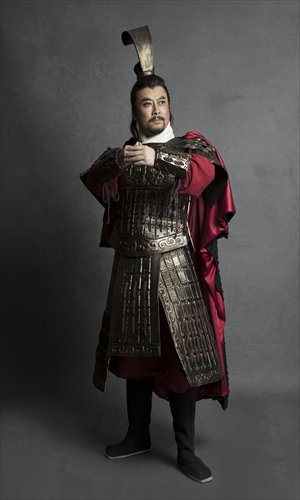Once more unto the breach …
Many movie fans will be familiar with Zhang Yimou's 2004 film, House of Flying Daggers. However, few will be aware that the film's Chinese name, Shimian Maifu, has nothing to do with the story told but is actually related to a man who lived more than 2,000 years ago. Han Xin was a general who served the first emperor of the Han Dynasty (206BC-220AD), Liu Bang and he contributed much to the flourishing of this dynasty through his brilliant military tactics.
The Chinese idiom, shimian maifu, translated into English means "being ambushed from 10 sides with nowhere to run." The saying originates from a famous battle between the army under Han's leadership and Chu forces under their commander, Xiang Yu. Xiang, at this time, presented the biggest obstacle to Liu Bang's plans to create a vast empire.
The Chu army was eventually ambushed by Han, resulting in Xiang's suicide.

Exit route
However, when theater director Guo Xiaonan, created a production about Han Xin recently, he changed the idea from shimian maifu to jiumian maifu ("being ambushed from nine sides").
Guo believes that Han actually left an exit route open for Xiang by which he could flee the battle scene. However, given the scale of his eventual defeat, Xiang spurned this option, unable to contemplate eking out an ignoble existence.
"This is what a historian from Han and Xiang's hometown in Jiangsu Province told me when I was preparing for the production, Han Xin," Guo told the Global Times. "And I think it fits in with what we know about the personalities of Han and Xiang."
Last night, Guo's Han Xin was premiered at the Shanghai Dramatic Arts Centre and will play every night except Monday, until May 19.
Guo, who has directed various stage works, including traditional Chinese operas since graduating from the Shanghai Theater Academy in the 1980s, believes that presenting a historical play is particularly challenging.
"It is unlike traditional Chinese operas, which have strict and well-established performing conventions. Modern plays are an import from the West and to depict an ancient Chinese theme through this tradition is very unusual," Guo said. "In addition, our understanding of history is a subjective thing. No one today knows what really happened back in 200BC, and, everyone seems to decide on their own interpretations of it anyway."
Personal readings
Guo believes that creating a historical play will unavoidably contain the personal readings of the director, playwright, and the actors involved.
"Our mission is to present this play, not to recover the historical truth of this incident," added Guo.
During rehearsals Guo has made good use of his long-term experience of directing traditional Chinese operas. He invited a famous Huaiju Opera (a regional opera form originating in Jiangsu Province) actor, He Shuanglin to coach the actors in physical work. So, audiences will see the actors using movements similar to those in traditional Chinese operas. "I think it's vital for these actors to express the imposing manner of these ancient heroes, something which 'modern' acting training doesn't allow for," Guo said.
For Guo, and stage designer Sang Qi, there was also the problem of depicting epic battle scenes in a limited space, a dilemma they resolved with the use of so-called war flags.
"We used flags with different colors and Chinese characters to represent the two sides in the battles, namely the Han and Chu armies. And the reverse side of these flags shows whether they have lost or won the battle," said Sang.
Sang added that they also use large amounts of bamboo, and fake stones and rocks on stage. "The bamboo was all roasted on a fire beforehand to give it a carbon-black look which we believe helps creating a warlike atmosphere," he said.
Widely discussed
Both men agree that historical plays, generally, fare poorly in the Chinese theater market. Perhaps the most successful example of recent times was Chen Xinyi's Shang Yang from 1996. Shang Yang was a statesman and reformer during the Qin Dynasty (221BC-206BC) who devoted himself to changing the way the state was administered by emphasizing meritocracy and the evolvement of power from the nobility. He was executed by being tied to five bolting horses who tore his body to pieces.
Shang Yang depicted his life's struggle with the director Chen commenting that she wanted to show the "cruelty and helplessness of human nature, which exists at any moment in time."
Zhu Rongji, the former Chinese premier, was moved to tears after seeing the play in Beijing.
Date: Until May 18, 7:30 pm, May 19, 2 pm
Venue: Shanghai Dramatic Arts Centre
上海话剧艺术中心
Address: 288 Anfu Road
安福路288号
Tickets: 150 and 300 yuan
Call 6473-0123 for details